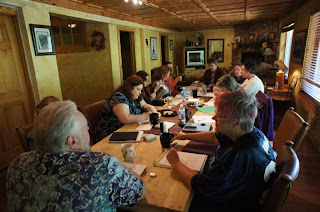It's taken me a long time to realize that writing fiction, that is, composing a readable work of fiction is similar to writing a song. From all I can gather songwriters either come up with the lyrics and then try to find the tune embedded in the words or first compose the music and then find the words that fit the music. In fiction there are the lyrical components as well - the words, and the musical score, which is the structure of the story.
In my writing career I have been trying to do both simultaneously; letting the story evolve on its own and then rearranging, rewriting, and editing the structure into something worth reading. Only of late did I make the musical epiphany and decide that I've probably been doing it wrong, or at least wasting valuable time. Now I see that the structure of a composition is a thing apart from the story being told.
The top level organization of a classic short story is: Introduction, Exposition, Epiphany, and Denouement. The Introduction sets up the story's problem that will eventually be "solved" at the end. Along the route to the Denouement there should be no more than three challenges to success, with the final challenge leading to the Epiphany or realization of the solution. There should be high and low points. Throughout the presentation there should be a bass line to set the tone of the piece. What's left is to sprinkle the composition with a few bright notes of brilliance, a not-too-long stretch of expositions, and maintain a consistent refrain for each character. Pull all those elements together and you have built a perfect structure for the story.
All you have to do then is add the words.
In my writing career I have been trying to do both simultaneously; letting the story evolve on its own and then rearranging, rewriting, and editing the structure into something worth reading. Only of late did I make the musical epiphany and decide that I've probably been doing it wrong, or at least wasting valuable time. Now I see that the structure of a composition is a thing apart from the story being told.
The top level organization of a classic short story is: Introduction, Exposition, Epiphany, and Denouement. The Introduction sets up the story's problem that will eventually be "solved" at the end. Along the route to the Denouement there should be no more than three challenges to success, with the final challenge leading to the Epiphany or realization of the solution. There should be high and low points. Throughout the presentation there should be a bass line to set the tone of the piece. What's left is to sprinkle the composition with a few bright notes of brilliance, a not-too-long stretch of expositions, and maintain a consistent refrain for each character. Pull all those elements together and you have built a perfect structure for the story.
All you have to do then is add the words.
